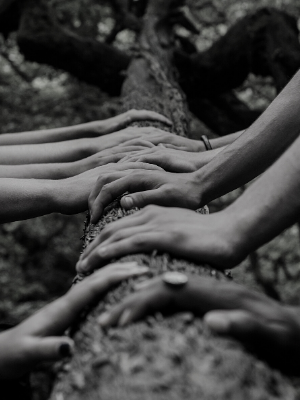 As we enter spring, summer vacation is approaching. While sometimes a vacation is the perfect break from daily life, other times it may feel like a too short escape. Sometimes, as women, we don’t wish only to take a week away from our lives. Sometimes we want to take a deeper look at how we are feeling in our lives and what belongs here, now?
As we enter spring, summer vacation is approaching. While sometimes a vacation is the perfect break from daily life, other times it may feel like a too short escape. Sometimes, as women, we don’t wish only to take a week away from our lives. Sometimes we want to take a deeper look at how we are feeling in our lives and what belongs here, now?
Once in a while, a woman admits she skipped the annual girlfriends cocktails on the beach trip or perhaps gifted herself a rare week away alone because she knew she was being called to do something else. That voice came from nowhere but within. Rather than a break, sometimes women want to put the brakes on everything, step back and connect: This is my life: how awake am I to the living of it?
Sometimes we want to listen into our own center with less noise around. We want to take an honest look at whether we are allowing ourselves to feel what we truly feel, be who we want to be and do what we most want to do – and how we, ourselves, might be getting in our way. We want to see if we have fallen into getting by in life instead of enchanting our lives. We want to reimagine our possibilities and shift, within ourselves, to be more intentionally in alignment with our desires.
When women choose a women’s retreat, it’s often because they are confronting a crossroads or seek soul nourishiment or simply a fuller sense of aliveness. Which also means they want an experience of life that is nourished from within rather than defined by constant striving. While often held in an idyllic location with exceptional scenery, the real invitation of a women’s retreat is as much to the inner journey as it is to the travel adventure.
Debating about summer plans?
Here are some reasons why you might choose a women’s retreat this year instead of just the usual summer vacation.
You will release stress and be nurtured. Even short mindfulness retreats have shown a significant reduction in stress and anxiety levels and improved biological markers of inflammation. Going on retreat is a way to strip away the distractions and allow yourself to simply be nourished – by your host, by the warmth and sharing of your fellow participants, by the rich offerings of your surroundings. But not only that – you again remember how to truly nourish yourself while on retreat and the importance of that, and not just for a week.
You can disrupt your routine and thought patterns. We typically think at least 6,000 thoughts a day (some say far more) and up to 90% of thoughts are repetitive. Talk about exhausting! At a retreat, you release control of the small decisions and surrender into a different and foreign rhythm. Why does that matter? It disrupts and shakes up your repetitive thought patterns and creates spaciousness in which you can hear other voices within. It’s amazing how the questions and also being-ness that lie buried just under the busy-ness begin to surface.
You will get back into your body and intuition. We live so predominantly in our minds in the modern world and even more so as faces on screens in the virtual workplace. And how much of achievement culture is based on striving and producing at all costs, even if overriding the physical self? Have your ever actually, even once, crossed off the entire to-do list and finally got to the landing? You have to create it for yourself, regardless. A retreat invites you to get back into your body. Whether through breathing or meditation or yoga or free movement, you are given the opportunity to connect with your body and the rich and embodied insight that lives in your cellular awareness.
You will step out of your roles. We play many roles in our lives, but sometimes, we can get so enmeshed with them that the roles start to parade around as us. A role includes any ‘part’ you play from which you derive value, worth or a sense of identity – both the roles that you love (chief executive, favorite grandmother) and roles that you don’t (undervalued team member, sleepless mom of a difficult child). No matter the role, no matter who assigned it to you, no matter what you’ve made it mean and no matter how much your identity may be wrapped up in it, every role is too small. Sometimes we derive our worth from the roles we play and the scripts we’ve created, displacing it from our core. We can also victimize or aggrandize ourselves through roles. Stepping out of them challenges you to value yourself inherently.
You will be seen, heard and validated. Small talk comprises up to one-third of our speech, and plays an important role in social interaction. But women do not come to a retreat to have the usual conversation. A retreat circle is a circle of women who usually did not know each other previously: it can provide a place without history. No blueprint of your identity exists here. Women often come to shake up the conversation they have with themselves. And sometimes, all it takes is being heard saying something you thought you could not, so you can finally clear your throat and let your voice come through. You are invited to be raw and authentic and unresolved. In a women’s retreat, women come together with the intention to honor and support each other – but in doing so, we also redefine what that means.
You can expect some perspective shifts. Of course, putting yourself in new and often incredible surroundings can refresh your perspective. But, if you dare, expect more. Whether we want to face it, there is no one consensus reality. Our experience of life emerges through our practices of perception. In the context of a women’s retreat, you may be able to see where you are buying into beliefs about yourself and the world that have never worked for you. You may be able to see where you are inhibiting yourself with the patterns or false virtues or committing to things you don’t want to with regular reinforcing action, instead of what you want. What if you’ve played down the part of you that would benefit you most to play up? You may recognize that you are sitting in victimhood where it would feel so much more empowering to recognize your agency and your choice. What if the world and your options are not nearly as limited as you have been determined to see them?
You may feel a rush of life force or have new visions. In a women’s retreat, you are invited to remember that being self-loving is how you fill your own cup, so that you can spill over. As you begin to pour into yourself on retreat, with less going on externally to take up space within you, do not be surprised if you begin to feel like you are accessing more of yourself. You may find more to be grateful for. You may remember a vivid energy or quality about yourself that you’ve forgotten and now want to bring back. Or a new way you want to share from your heart. You may realize you have enough resource and energy to make real steps, first within, towards a change you wish for. You may simply feel more at peace and able to be less shaken by the chaos outside of you. But it would be very rare if you thought and felt exactly the same as you did arriving.
Which is the main point, really. So, the biggest reason to skip the traditional summer vacation and go on a women’s retreat this year? What animates you most in life is living into and showing up for this adventure of you.
By: Aimee Hansen – Our “Heart” coach, interviewer, and lead writer – is a women’s retreat creator and facilitator. The Journey Into Sacred Expression writing and yoga women’s retreats on Lake Atitlan in Guatemala are recommended in Lonely Planet Wellness Escapes and have been praised by the nearly 200 women who have gathered with her. Circle with women underneath volcanoes to write, meditate, do yoga, move and participate in various sessions. She has two summer events in 2023: July 7-15 and Aug 25 – Sept 2. Each has 12 spaces only.





